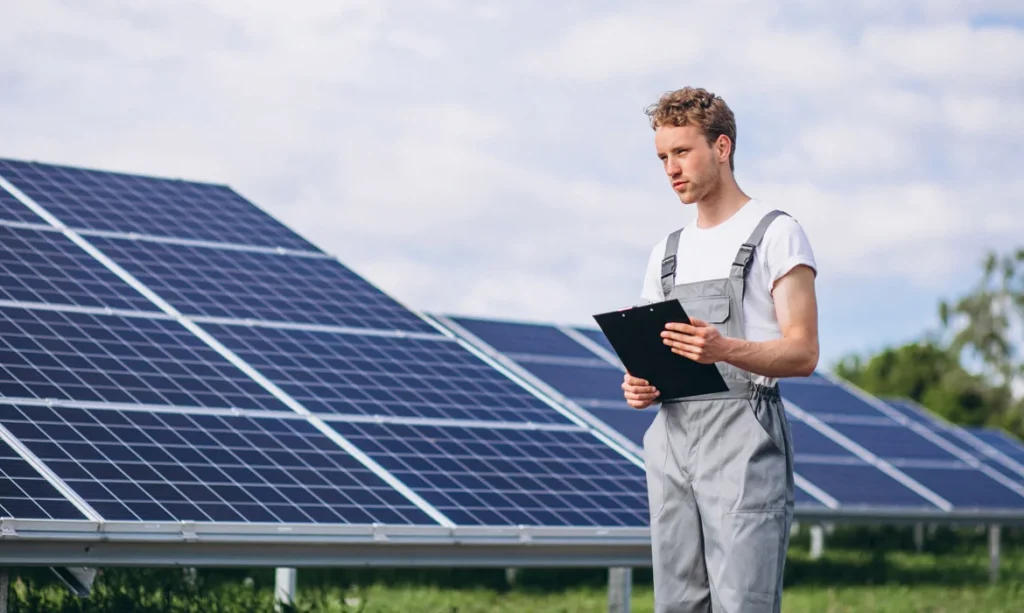
Choosing the right solar installer is a crucial step in your journey towards energy independence and sustainability. A good installer ensures your system is designed and installed correctly, maximizing efficiency and longevity. This article provides a comprehensive guide on how to select the right solar installer, including essential tips and tricks.
Why Choosing the Right Solar Installer Matters
- System Performance: A professional installer ensures your solar system operates at peak efficiency, maximizing energy production and savings.
- Safety: Proper installation minimizes risks associated with electrical systems and structural components.
- Longevity: High-quality installation extends the lifespan of your solar system.
- Peace of Mind: Knowing your system is in expert hands reduces stress and uncertainty.
Steps to Choose the Right Solar Installer
- Research and Shortlist Installers: Begin by researching solar installers in your area. Create a shortlist based on reviews, recommendations, and online ratings. Trusted review sites, local solar energy associations, and word-of-mouth referrals are great starting points.
- Check Credentials and Certifications: Ensure your chosen installer has the necessary certifications and licenses. Key certifications to look for include:
- NABCEP Certification: The North American Board of Certified Energy Practitioners (NABCEP) certification is a gold standard in the solar industry.
- State and Local Licenses: Verify that the installer holds all required licenses for your state or locality.
- Evaluate Experience and Track Record: An experienced installer is more likely to provide high-quality service. Ask how many installations they have completed, particularly those similar to your project. Check their track record for successful installations and satisfied customers.
- Review Customer Feedback and Testimonials: Look for customer reviews on platforms like Google, Yelp, and the Better Business Bureau. Pay attention to both positive and negative feedback, focusing on the installer’s responsiveness, quality of work, and customer service.
- Assess Product Quality and Warranties: A reputable installer will offer high-quality products and comprehensive warranties. Inquire about:
- Solar Panel Brands: Ensure they use reliable, high-efficiency solar panels from reputable manufacturers.
- Inverter Options: Ask about the types of inverters they offer and their respective warranties.
- Warranty Coverage: Check the length and terms of warranties for both equipment and installation work.
- Get Multiple Quotes: Obtain quotes from at least three different installers. Compare the proposals based on cost, system design, projected energy savings, and warranty terms. Be wary of quotes that are significantly lower than others, as they may indicate lower quality or hidden costs.
- Check for Local Knowledge: Local installers are familiar with the regional climate, utility regulations, and permitting processes. They are also more likely to provide prompt service and support.
- Evaluate Financing Options: A good installer will offer various financing options, including solar loans, leases, and power purchase agreements (PPAs). Choose an installer who can guide you through the best financial option for your situation.
- Ask About After-Sales Support: Post-installation support is crucial for maintenance and troubleshooting. Ensure the installer offers robust after-sales support, including maintenance services and prompt responses to any issues that arise.
Questions to Ask Potential Installers
- What certifications and licenses do you hold?
- How many installations have you completed, and can you provide references?
- What brands of solar panels and inverters do you use, and why?
- What warranties do you offer on equipment and installation?
- Can you provide a detailed breakdown of the costs involved?
- What financing options are available, and which do you recommend for my situation?
- How will you handle permitting and inspections?
- What kind of after-sales support do you offer?
Red Flags to Watch Out For
- Lack of Certifications: Avoid installers who lack proper certifications and licenses.
- Poor Reviews: Consistently negative reviews or unresolved complaints are warning signs.
- Unrealistically Low Quotes: Be cautious of quotes that are significantly lower than the competition, as they may indicate subpar quality or hidden costs.
- High-Pressure Sales Tactics: Reputable installers provide information and allow you to make an informed decision without pressure.
- Vague Answers: Clear and detailed answers to your questions are a sign of a knowledgeable and trustworthy installer.
Conclusion
Choosing the right solar installer is a critical step in ensuring the success of your solar energy project. By conducting thorough research, verifying credentials, and comparing multiple quotes, you can find an installer who meets your needs and guarantees a high-quality installation. Follow these tips and tricks to make an informed decision, ensuring a smooth and successful transition to solar energy.
